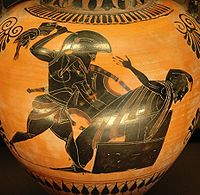- Neoptolemus
-
For other uses, see Neoptolemus (disambiguation).
Neoptolemus (also Neoptólemos or Pyrrhus; Greek Νεοπτόλεμος, "New War") was the son of the warrior Achilles and the princess Deidamia in Greek mythology. Achilles' mother foretold many years before Achilles' birth that there would be a great war. She saw that her only son was to die if he fought in the war. She sought a place for him to avoid fighting in the Trojan War, due to a prophecy of his death in the conflict. She disguised him as a woman in the court of Lycomedes, the King of Scyros. During that time, he had an affair with the princess, Deidamea, who then gave birth to Neoptolemus. Neoptolemus was originally called Pyrrhus, because the female version of that name, Pyrrha, had been taken by his father while disguised as a woman.
The Greeks captured the Trojan seer, Helenus, and forced him to tell them under what conditions could they take Troy. Helenus revealed to them that they could defeat Troy if they could acquire the poisonous arrows of Heracles (then in Philoctetes' possession); steal the Palladium (which led to the building of the famous wooden horse of Troy); and put Achilles' son in the war. Neoptolemus killed six men on the field of battle.[1]
In response to the prophecy, the Greeks took steps to retrieve the arrows of Heracles and bring Neoptolemus to Troy. Odysseus was sent to retrieve Neoptolemus from Scyros. The two then went to Lemnos to retrieve Philoctetes. Years earlier, on the way to Troy, Philoctetes was bitten by a snake on Chryse. Agamemnon had advised that he be left behind because the wound was festering and smelled bad. This retrieval is the plot of Philoctetes, a play by Sophocles. Euripides, in his play Hekabe (also known as Hecuba), has a moving scene (ll 566-575) which shows Neoptolemus as a compassionate young man who kills Polyxena, Hekabe's daughter with ambivalent feelings and in the least painful way.
Neoptolemus was held by some to be cruel and savage. During and after the war, he killed Priam, Eurypylus, Polyxena, Polites and Astyanax, among others, enslaved Helenus, and forced Andromache to become his concubine. The ghost of Achilles appeared to the survivors of the war, demanding Polyxena, the Trojan princess, be sacrificed before anybody could leave. Neoptolemus did so. With Andromache, Helenus and Phoenix, Neoptolemus sailed to the Epirot Islands and then became the King of Epirus. With the enslaved Andromache, Neoptolemus was the father of Molossus and through him, according to the myth, an ancestor of Olympias, the mother of Alexander the Great. According to Hyginus, his son with Andromache was Amphialus.[citation needed]
Although Neoptolemus is often depicted thus, the play Philoctetes by Sophocles shows him being a much kinder man, who honours his promises and shows remorse when he is made to trick Philoctetes. Two accounts deal with Neoptolemus' death. He was either killed after he attempted to take Hermione from Orestes as her father Menelaus promised, or after he denounced Apollo, the murderer of his father. In the first case, he was killed by Orestes. In the second, revenge was taken by the Delphian priests of Apollo.
Neoptolemus or Pyrrhus in art and literature
- Neoptolemus is one of the main characters in Philoctetes, a tragedy by Sophocles.
- Andromache, a tragedy by Euripides. Neoptolemus does not appear on stage but his death at Delphi is described
- Apollodorus' Library, in Book 3 and in the Epitome 5.10-12, 5.21, 5.24
- The Aeneid by Virgil
- The Posthomerica, an epic poem by Quintus of Smyrna
- Pyrrhus features in the player's speech in Shakespeare's Hamlet (Act 2, Scene 2) where his killing of Priam is described
- Pyrrhus is a leading character in Andromaque (1667), a play by Jean Racine
- Andromaque (1780), an opera by Grétry based on Racine's play
- Ermione (1819), an opera by Gioachino Rossini based on Racine's play
- An Arrow's Flight, a novel by Mark Merlis
Mentioned briefly in Euripides' plays Trojan Women and Hecuba, simply stating that Andromache, wife of Hector, was his promised spear bride.
References
- ^ Hyginus, Fabulae 114.
External links
 Chisholm, Hugh, ed (1911). "Neoptolemus". Encyclopædia Britannica (11th ed.). Cambridge University Press.Categories:
Chisholm, Hugh, ed (1911). "Neoptolemus". Encyclopædia Britannica (11th ed.). Cambridge University Press.Categories:- Greek mythology
- People of the Trojan War
- Characters in Book VI of the Aeneid
- Ancient Epirotes
- Greek regicides
- Skyros
Wikimedia Foundation. 2010.


